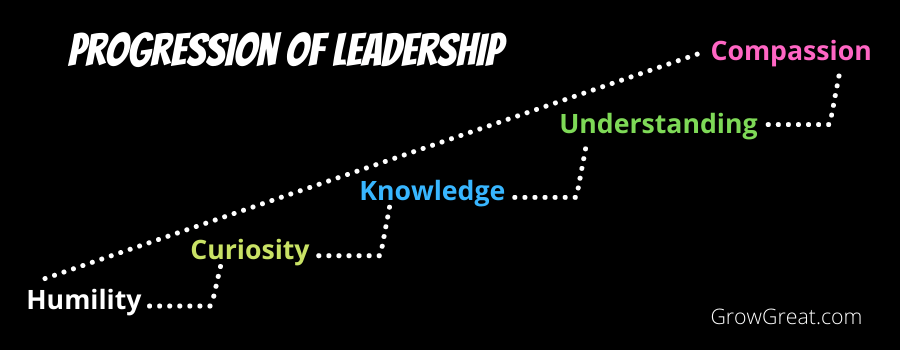Podcast: Play in new window | Download (Duration: 14:57 — 13.7MB)
Subscribe: Apple Podcasts | Spotify | RSS | More
Perspective matters.
How we see the world and our place in it largely determines our behavior. Take some time today and think about that more deeply. Here are some questions that can help get you started.
- Why am I doing what I’m doing?
- How would you describe what you do?
- If you were one of your employees, how would you grade yourself?
- What are you doing today that you didn’t do earlier in your career?
- What have you stopped doing that you did earlier in your career?

The Bula Network Progression Of Leadership demonstrates a stair-step progression and an endless loop. Both at the same time.
Each component is important with humility leading the parade because the absence of humility foils the progression. Without humility, all progress stops because it stomps down everything else.
Lean into humility by coming to terms with what you don’t yet know. Or understand. That’s going to require courage and generosity, two major components of leadership humility. There likely has always been an epidemic – a shortage, anemia – of leadership humility. Especially here in the United States where we can quickly fixate on hierarchy. Too often we’re more interested in being the boss than being the leader. They are not the same!
So maybe that’s where we should begin. How do you view being the boss versus being the leader? Do you make any distinctions between the two? If not, that’s okay. I’m happy to provide compelling evidence to prove they’re very different.
Bosses do have a degree of power. That’s not necessarily a bad thing. It depends on how that power is used. So let’s wrestle that down.
What’s the purpose of your power as a boss?
Is it your job to solve all the problems? To come up with all the solutions? To be seen as the smartest person to whom everybody else goes?
Permit me to challenge that viewpoint. When you look at the number of people on your team or in your organization I’m guessing it’s a number greater than you. It’s not uncommon for me to work with a leader of a small team of a dozen or more. Nor is it uncommon for me to work with a leader who is in charge of thousands of employees. Size doesn’t matter, but what does matter are the varieties of people with whom we do our work. Lots of people doing lots of different things. People who have some opinions about the work they do. Don’t jump to the conclusion just yet, “Yes, but they don’t all understand the things I understand.” True enough, but tap the brakes on their lack of understanding for the moment.
Too often leaders use that excuse as a reason to not listen to employees. I’ve two counterpoints to that argument. One, listening gives you the opportunity to enlighten them on what they don’t understand. But more importantly, two, it gives you the opportunity to be enlightened by them on things you don’t understand — but you don’t know it. Any more than they know it. Both of you are benefited and most of all, the enterprise benefits by your collective efforts to share insights.
I don’t often give advice to clients because I choose to let them live their own lives, make up their own minds and figure things out that work best for them. However, I always begin by sharing as honestly as I can how I see the world of leadership because I don’t want to impose. I want to persuade. I want to be a leader with a high impact.
Here are some truths that begin every coaching engagement.
We lead people. We manage the work. They aren’t the same.
Leadership is influence. Period. It’s not power. It’s not being a boss.
When the boss – the one with the power – has the highest influence – leadership – then it’s remarkably powerful. Everybody benefits.
Leaders do for others what they’re unable to do for themselves. Leaders who have boss authority, even more so!
Leaders take aim at helping people perform better by making sure they have the resources they need. That includes removing the roadblocks that prevent high performance.
Leadership is based on humility where the focus is on others. It’s all about helping others do great work.
My clients may have never heard these things. Or maybe they’ve never heard these things expressed in that way. They never disagree though, and I think that’s mostly because these are leaders who are open to, anxious for, their own self-improvement and growth. That means, they’ve already got a high degree of humility before I’m ever engaged to serve them. As long as there’s sufficient humility to accept responsibility for ourselves and our influence, there’s my high expectation that growth and improvement are probable. I’ve never found an exception.
Blindspots are the bane of every leader. What we don’t know will hurt us and our organization. We avoid that by refusing to silo ourselves thinking that every problem is ours alone to solve. Or that every good idea must come directly from our mind. By understanding that we’re surrounded by people who get up each morning wanting to do good work, we’re better able to contribute to giving them a garden in which they can grow best.
Great leaders grow people. Growing people perform the best work.
That’s my point of view. What’s yours?
Are you interested in growing your leadership? Do you think a personal, confidential one-on-one coaching experience might suit you well? Then call or text me at (214) 682-2467. I’m here to help.

 About the hosts: Randy Cantrell brings over 4 decades of experience as a business leader and organization builder. Lisa Norris brings almost 3 decades of experience in HR and all things "people." Their shared passion for leadership and developing high-performing cultures provoked them to focus the Grow Great podcast on city government leadership.
About the hosts: Randy Cantrell brings over 4 decades of experience as a business leader and organization builder. Lisa Norris brings almost 3 decades of experience in HR and all things "people." Their shared passion for leadership and developing high-performing cultures provoked them to focus the Grow Great podcast on city government leadership.
The work is about achieving unprecedented success through accelerated learning in helping leaders and executives "figure it out."
